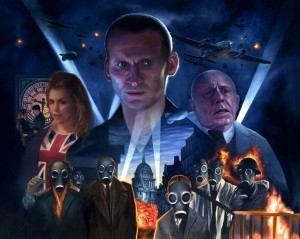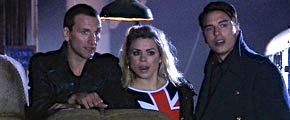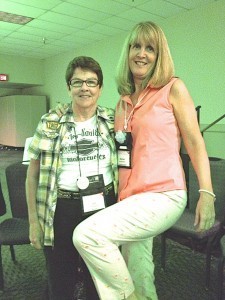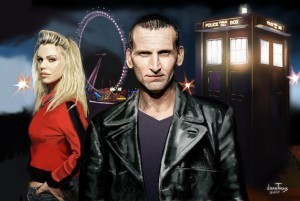Jennifer Crusie's Blog, page 299
May 6, 2013
Next Who Sunday: The Empty Child/The Doctor Dances
We’re skipping three episodes this time, “Dalek,” “The Long Game,” and “Father’s Day,” (I know, I know, but there are seven seasons to skim through, so we’re going to be skipping some good stuff), but we can’t skip “The Empty Child/The Doctor Dances.” If you forced me to pick the best Who story it would be this one, a blend of horror and comedy, heartbreak and jubilation, Who at its best. You’ll never hear the word “Mummy” again without shivering, so one thing to look at is the way Davies never undercuts the horror with the comedy but balances the two to create just the right amount of tension. Also metaphor: there’s a lotta talk about dancing going on here.

May 5, 2013
Who Sunday: Aliens of London/WW3: Russell T. Davies
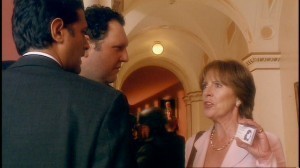 A cast of thousands, a broken Big Ben, and Harriet Jones. How do you feel about large casts, two-part episodes (could this have been done better in one?) and subplots explaining to loved ones where you’ve been for a year? Also, Harriet Jones.
A cast of thousands, a broken Big Ben, and Harriet Jones. How do you feel about large casts, two-part episodes (could this have been done better in one?) and subplots explaining to loved ones where you’ve been for a year? Also, Harriet Jones.

Who Sunday: Aliens of London/WW3
 A cast of thousands, a broken Big Ben, and Harriet Jones. How do you feel about large casts, two-part episodes (could this have been done better in one?) and subplots explaining to loved ones where you’ve been for a year? Also, Harriet Jones.
A cast of thousands, a broken Big Ben, and Harriet Jones. How do you feel about large casts, two-part episodes (could this have been done better in one?) and subplots explaining to loved ones where you’ve been for a year? Also, Harriet Jones.

May 4, 2013
Cherry Saturday 5-4-2013
Late again. Very sorry. So, what’s new with you?
ETA: Cherries at RT, Jill and Kieran.
Also, this is Argh’s 900th post.

April 29, 2013
Toni’s Post
April 28, 2013
Next Who Sunday: Aliens of London/WW3: Russell T. Davies
I hate skipping two episodes, especially since we meet Cassandra in “The End of the World” and Charles Dickens in “The Unquiet Dead” (not to mention Gwyneth), but we can make up for it by meeting Harriet Jones (yes, Harriet, we know who you are), UNIT, and the Slitheen. The double episode is also a good look at the effect time travel has on the people left behind, which I thought was an interesting way to go; it’s not all exploring worlds, it’s about people, too. Mostly about people, actually; the Doctor is a real people person. Unfortunately, it’s two hours of fart jokes, which I could do without, but it’s still good storytelling. Plus Harriet Jones.
One thing to look at in this story is managing huge casts. I love a large cast of characters to work with, but this story has a lot of speaking parts–the Doctor, Rose, Mickey, Jackie, Harriet Jones, the Slitheen who show up in different bodies, the political aide who should have been wearing a red shirt, UNIT, a platoon of soldiers, the morgue attendant, the pig–and they’re all established pretty well, both visually and by their character actions. I have to confess, I like the smaller cast stories because they feel more intimate (see the two episodes we’re skipping), but I think handling this many characters takes skill, although it does help that the plot is your basic Aliens Here To Take Over the World. Thank God they’re calcium based.

Next Who Sunday: Aliens of London/WW3
I hate skipping two episodes, especially since we meet Cassandra in “The End of the World” and Charles Dickens in “The Unquiet Dead” (not to mention Gwyneth), but we can make up for it by meeting Harriet Jones (yes, Harriet, we know who you are), UNIT, and the Slitheen. The double episode is also a good look at the effect time travel has on the people left behind, which I thought was an interesting way to go; it’s not all exploring worlds, it’s about people, too. Mostly about people, actually; the Doctor is a real people person. Unfortunately, it’s two hours of fart jokes, which I could do without, but it’s still good storytelling. Plus Harriet Jones.
One thing to look at in this story is managing huge casts. I love a large cast of characters to work with, but this story has a lot of speaking parts–the Doctor, Rose, Mickey, Jackie, Harriet Jones, the Slitheen who show up in different bodies, the political aide who should have been wearing a red shirt, UNIT, a platoon of soldiers, the morgue attendant, the pig–and they’re all established pretty well, both visually and by their character actions. I have to confess, I like the smaller cast stories because they feel more intimate (see the two episodes we’re skipping), but I think handling this many characters takes skill, although it does help that the plot is your basic Aliens Here To Take Over the World. Thank God they’re calcium based.

Who Sunday: “Rose”: Russell T. Davies
When Russell Davies rebooted the Dr. Who series, he took on an epic with all the troubles that entails: You don’t mess around with the Doctor. He had to satisfy fans, most of whom were adults with very clear and very rabid ideas from their childhoods of Who the Doctor was (that would be twenty-six previous seasons, starting in 1963). But he also had to make the series accessible to people like me, who’d never seen it before. He had to make it old and make it new and make it on what was evidently a limited budget, although not as limited at the classic Whos (compare the first season to the seventh and you’ll see a big budget increase apparent on the screen).
A lot was riding on “Rose,” the first episode. That made it a big undertaking for him, but a perfect place for us to talk about how to begin a story. For example:
What makes “Rose” a brilliant reboot to the old series? (You can disagree that it’s brilliant, of course, but really, did you watch it?)
What shorthand did Davies use in characterization to get the major players in the viewers’ minds quickly and indelibly?
How did Davies handle twenty-six seasons of back story for the new people?
Feel free to add your own questions, too. Much like the Doctor, we’re here to explore, just looking for things that make us say, “Fantastic!”
Oh, and if you haven’t see “Rose” yet, you might want to avoid the comments: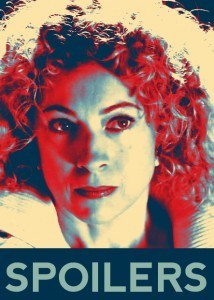
[Note: I can't find the original of that image; if anybody knows who made it, please let me know so I can give credit.]

Who Sunday: “Rose”
When Russell Davies rebooted the Dr. Who series, he took on an epic with all the troubles that entails: You don’t mess around with the Doctor. He had to satisfy fans, most of whom were adults with very clear and very rabid ideas from their childhoods of Who the Doctor was (that would be twenty-six previous seasons, starting in 1963). But he also had to make the series accessible to people like me, who’d never seen it before. He had to make it old and make it new and make it on what was evidently a limited budget, although not as limited at the classic Whos (compare the first season to the seventh and you’ll see a big budget increase apparent on the screen).
A lot was riding on “Rose,” the first episode. That made it a big undertaking for him, but a perfect place for us to talk about how to begin a story. For example:
What makes “Rose” a brilliant reboot to the old series? (You can disagree that it’s brilliant, of course, but really, did you watch it?)
What shorthand did Davies use in characterization to get the major players in the viewers’ minds quickly and indelibly?
How did Davies handle twenty-six seasons of back story for the new people?
Feel free to add your own questions, too. Much like the Doctor, we’re here to explore, just looking for things that make us say, “Fantastic!”
Oh, and if you haven’t see “Rose” yet, you might want to avoid the comments:
[Note: I can't find the original of that image; if anybody knows who made it, please let me know so I can give credit.]


